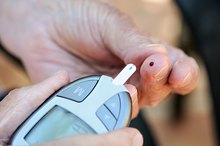Side Effects of Eating Too Much Iron
Iron, an essential mineral, forms an integral part of enzymes and proteins necessary for vibrant health. The majority of your body’s iron is found in red blood cells, which transport oxygen. The recommended daily intake of iron for men is 8 milligrams and for women is 18 milligrams. According to the U.S. Food and Drug Administration, an intake of up to 45 milligrams of iron per day is safe. However, going overboard could prove disastrous to your overall health. For that reason, you should take iron supplements only after consulting your doctor.
Iron Overload
By eating too much iron, you can develop a condition called hemochromatosis. Iron can be toxic for your body when consumed in excess. It can contaminate your body organs, leading to organ failure. In hemochromatosis, iron can accumulate in your heart, pancreas and liver. Buildup of iron in the liver can cause liver cancer, cirrhosis, liver failure or an enlarged liver. Cirrhosis means scarring of the liver, which causes poor liver function. You can develop diabetes from iron overload in your pancreas. Accumulation of iron in your heart can cause heart failure and random heartbeats called arrhythmias. If left untreated, hemochromatosis may cause death.
- By eating too much iron, you can develop a condition called hemochromatosis.
- In hemochromatosis, iron can accumulate in your heart, pancreas and liver.
Gastrointestinal Side Effects
How to Test at Home for Iron in the Blood
Learn More
Consuming too much iron may produce gastrointestinal side effects such as heartburn, diarrhea, constipation, discomfort, nausea, liver damage, vomiting blood, black and bloody stools and metallic taste in your mouth.
Nervous System Side Effects
Excess iron intake can negatively affect your nervous system. You may experience symptoms such as dizziness, headache, convulsions, chills, fever and drowsiness. Overconsumption of this nutrient can kill your desire to do anything. In fact, you may also develop coma within half an hour to one hour after an iron overdose.
- Excess iron intake can negatively affect your nervous system.
Pulmonary Edema
How Long Does Iron Stay in Your System?
Learn More
Too much iron in your body may give rise to a condition called pulmonary edema. Pulmonary edema refers to an abnormal accumulation of fluid in your lungs' air sacs, which causes breathing difficulty. It may be accompanied by excessive sweating, anxiety or restlessness, wheezing sounds with breathing, the feeling of drowning, leg swelling, pale skin, coughing or spitting up blood and reduced alertness.
Other Side Effects
Although evidence is not conclusive, there may be a relationship between elevated iron levels and risk of Alzheimer's disease, cancer and heart disease, according to the University of Maryland Medical Center. People with inflammatory bowel disease such as ulcerative colitis and Crohn's disease seem to have large amounts of iron in the parts of their intestine that are inflamed. Other symptoms of too much iron include low blood pressure, dehydration, shock and fast and weak pulse.
Related Articles
References
- Office of Dietary Supplements: Iron
- University of Maryland Medical Center: Iron
- MedlinePlus: Iron Overdose
- MedlinePlus: Pulmonary Edema
- Abbaspour N, Hurrell R, Kelishadi R. Review on iron and its importance for human health. J Res Med Sci. 2014;19(2):164–174.
- National Heart, Lung, and Blood Institute. Iron-Deficiency Anemia.
- Vaucher P, Druais PL, Waldvogel S, Favrat B. Effect of iron supplementation on fatigue in nonanemic menstruating women with low ferritin: a randomized controlled trial. CMAJ. 2012;184(11):1247-54. doi:10.1503/cmaj.110950
- Stugiewicz M, Tkaczyszyn M, Kasztura M, Banasiak W, Ponikowski P, Jankowska EA. The influence of iron deficiency on the functioning of skeletal muscles: experimental evidence and clinical implications. Eur J Heart Fail. 2016;18(7):762-73. doi:10.1002/ejhf.467
- Cherayil BJ. The role of iron in the immune response to bacterial infection. Immunol Res. 2011;50(1):1–9. doi:10.1007/s12026-010-8199-1
- Jáuregui-lobera I. Iron deficiency and cognitive functions. Neuropsychiatr Dis Treat. 2014;10:2087-95. doi:10.2147/NDT.S72491
- Cleveland Clinic. How to Tell If You Have Iron Deficiency Anemia. Updated October 30, 2017.
- Murat S, Ali U, Serdal K, et al. Assessment of subjective sleep quality in iron deficiency anaemia. Afr Health Sci. 2015;15(2):621–627. doi:10.4314/ahs.v15i2.40
- Dosman CF, Brian JA, Drmic IE, et al. Children with autism: effect of iron supplementation on sleep and ferritin. Pediatr Neurol. 2007;36(3):152-8. doi:10.1016/j.pediatrneurol.2006.11.004
- Office of Dietary Supplements. Iron Fact Sheet for Health Professionals. Updated October 16, 2019.
Writer Bio
Mala Srivastava covers health and business for several online publications. She holds a Master of Science in microbiology from India's HNB Garhwal University and a Master of Pharmaceutical Business Management from ICFAI University.









